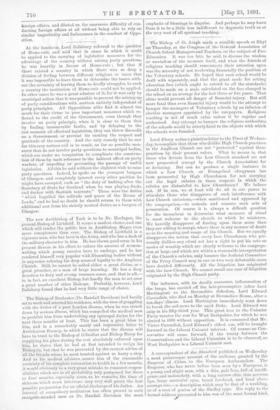At the luncheon, Lord Salisbury referred to the question of
Home-rule, and said that in cases in which it could be applied to the carrying of legislative measures for the advantage of the country without raising party questions, he was heartily in favour of Home-rule ; but that if there existed a country in which there was so deep a division of feeling between different religions or races that it was impossible to leave them to determine the issues with. out the certainty of leaving them to deadly struggles, to such a country the institution of Home-rule could not be applied. In other cases he was a great admirer of it, for it was only by municipal action that it was possible to prevent the mixing-up of party considerations with matters entirely independent of party principles. All Oppositions alike find it almost too much for their virtue to pass important measures which re- dound to the credit of the Government, even though they involve no party principle, when it is clear to them that by finding innumerable faults, and by delaying to the last moment all effectual legislation, they can throw discredit on a Government, or prevent its earning the respect and gratitude of the country. And the only remedy that he saw for this very serious evil is to remit, as far as possible, mea- sures that do not involve party questions to municipal bodies, which are under no temptation to complicate the construc- tion of them by tacit reference to the indirect effect on party
warfare, of impeding or preventing the passage of useful legislation. All this he said without the slightest wish to raise party questions. Indeed, he spoke as the youngest burgess of Glasgow, and completely ignored every other position be might have occupied, such as the duty of looking after the Secretary of State for Scotland when he was playing ducks and drakes with Scottish interests." These were the duties "which beguiled the solitude and peace of the House of Lords," and he had no doubt he should return to them with additional zest from his strictly neutral duties as a burgess of Glasgow.


































 Previous page
Previous page